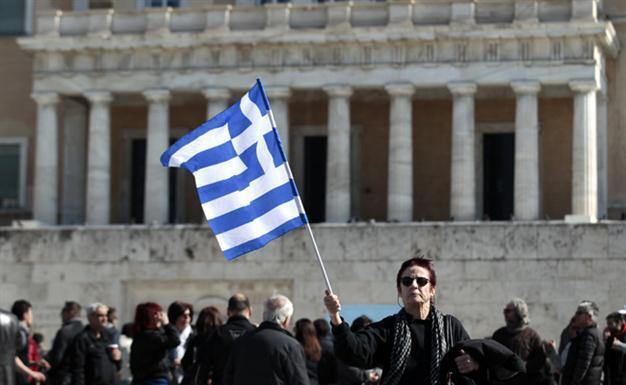Riot police guard Greek assembly as protesters gather
ATHENS- Reuters

A woman raises a Greek flag during an anti-austerity rally in front of the parliament in Athens. REUTERS photo
Riot police shielded Greece's national parliament on Sunday as demonstrators gathered to protest against austerity measures on the eve of talks in Brussels on a 130-billion-euro ($171 billion) bailout needed to avert bankruptcy.Hopes for a deal at the meeting of euro zone finance ministers have risen after Athens last week detailed new budget cuts. But sceptics, led by Germany, are wary about Greece's determination to shrink its debt mountain.
Only a few hundred protesters had assembled outside the national parliament by early afternoon but authorities are on guard after demonstrations last Sunday degenerated into looting and torching of buildings in central Athens.
"Maybe some people are scared after last week's rioting," said retired state electricity worker Costas Xenakis.
"The austerity measures are really hurting pensioners - we can't just sit and take it," said Costas, 70, whose monthly pension will be hit again by new cuts approved by caretaker Prime Minister Lucas Papademos' cabinet late on Saturday.
Banners such as one reading "Down with the memorandum of hunger" bore testimony to the anger many Greeks feel towards a political elite that allowed the country over the years to rack up a national debt worth 160 percent of national output while the super-rich took advantage of lax tax collection.
Ahead of an election due in April, a survey released on Sunday showed the two parties that have dominated politics since the 1974 end of junta rule - the Socialist PASOK and conservative New Democracy - would muster little more than a quarter of the votes between them, with parties to the left gaining ground.
One survey by pollster MRB showed that while 73 percent of Greeks want the country to stay in the single currency, just 49 percent believe it will manage to do so in the next two years.
After months of often acrimonious negotiations, Greek hopes are nonetheless rising that Monday's meeting in Brussels will endorse the rescue which Athens needs to avoid bankruptcy on March 20 when major debt repayments fall due.
"The Greek people have done everything they can and we are determined to make good on our commitments," Public Order Minister Christos Papoutsis said before an emergency cabinet meeting to outline final measures in a 3.3-billion-euro package which includes defence, health and labour ministry cuts.
On Friday, German Chancellor Angela Merkel, Italian Prime Minister Mario Monti and Papademos voiced optimism about a Greek accord during a conference call, Monti's office said.
Austrian Finance Minister Maria Fekter said on Sunday it appeared a deal was finally taking shape.
"I don't think there is a majority to go a different way because a different way is enormously arduous and costs lots and lots of money," she said in a television interview.
However, Jean-Claude Juncker, who will chair Monday's meeting of the Eurogroup in Brussels, had earlier made clear that urgent work was still needed over the weekend to get a programme to reduce Greece's crippling debts back on track.
















